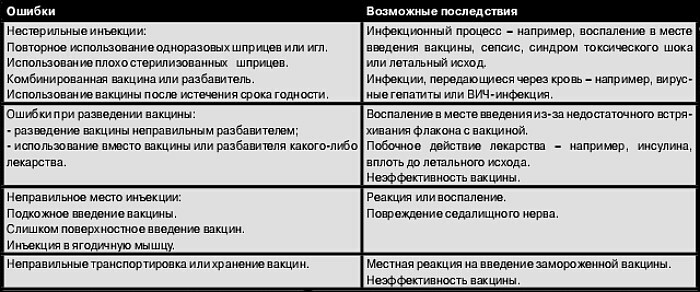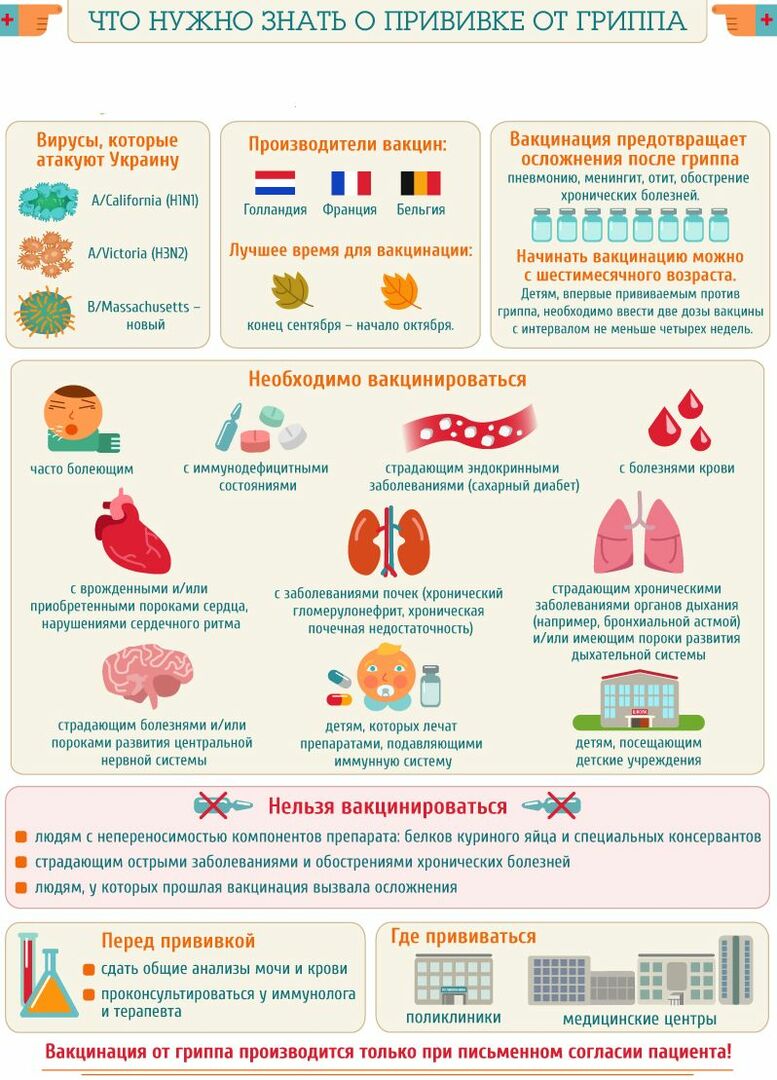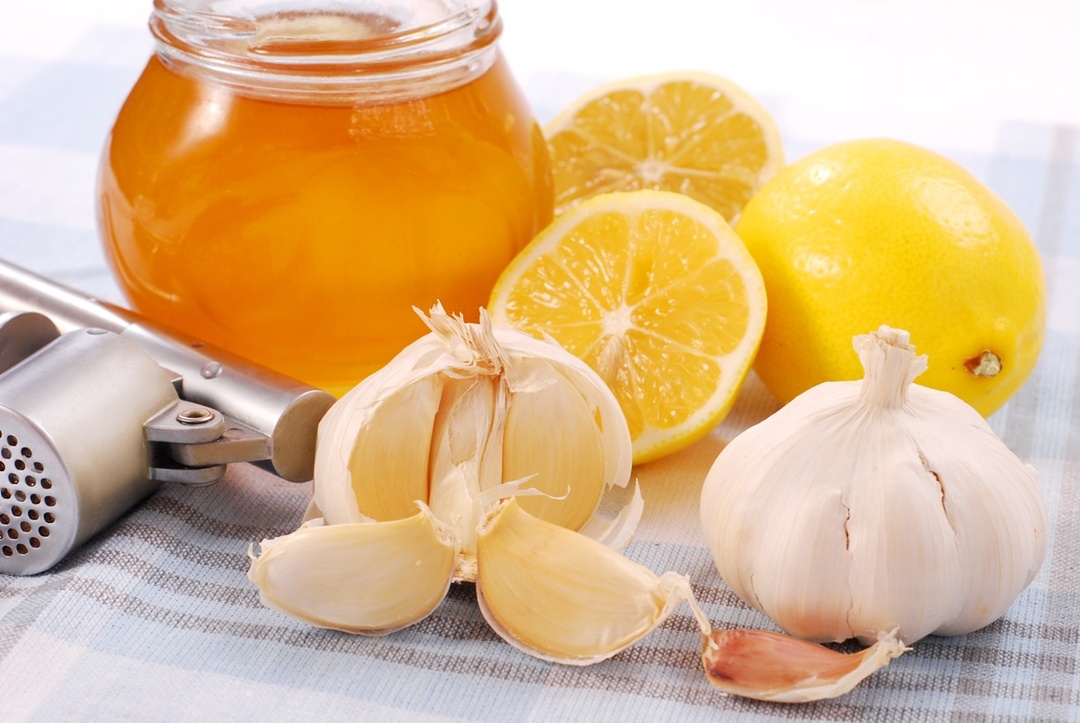Vaccination against influenza: truth and myths
 Influenza is an acute viral disease that primarily affects the person's airways.In comparison with other respiratory viral infections( ARI), the flu is most severe and leads to the development of serious complications, from which you can even die.That is why the world medical community pays great attention to the prevention of influenza.
Influenza is an acute viral disease that primarily affects the person's airways.In comparison with other respiratory viral infections( ARI), the flu is most severe and leads to the development of serious complications, from which you can even die.That is why the world medical community pays great attention to the prevention of influenza.
There are several methods to protect against influenza: avoiding crowded places, observing hygiene rules, strengthening immunity, taking antiviral drugs.However, the most effective and most "convenient" from the point of view of the modern pace of life by the method of preventing influenza is annual vaccination.
Table of contents: And how is the variability of the virus?Types of influenza vaccines How influenza vaccines work Influenza vaccination scheme Flu vaccination and indications for flu vaccination Influenza vaccination: contraindications Vaccination against influenza to pregnant women Side effects of influenza vaccines Myths about influenza vaccinationAnd how is the variability of the virus?Indeed, there are many types of influenza viruses that cause a specific disease in humans: two types( A and B) and a large number of subtypes( they are determined by a set of special proteins on the envelope of viral particles).In addition, when encountered in nature, two viruses can exchange genetic material, forming completely new strains( variants of viruses).Knowing this, the pharmaceutical industry annually changes the composition of the produced influenza vaccines.This is helped by WHO.Experts of this organization are engaged in monitoring the circulation of influenza viruses among the population and predicting which pathogens will be relevant in the coming season in each hemisphere.
Such a forecast with the indication of three strains of influenza viruses, as a rule, appears in March.After that, the development and production of vaccines begins.Over the past 20 years, a mistake in the prediction was made only once, while the inaccuracy concerned only one strain, information on the other two was fully confirmed with the onset of the epidemic of seasonal influenza.
Versions of influenza vaccines
There are four types of influenza vaccines:
- Live vaccines that contain weakened viruses that can cause flu-like symptoms.After using such drugs, good immunity is formed, but post-vaccination reactions and complications often develop.In addition, vaccinations against influenza live vaccines are contraindicated in many categories of the population, which greatly limits their use.With a sufficient number of "minuses" this group of drugs remains interesting for medical science, since live vaccines can be administered through the nose in the form of drops and sprays, which is especially important in view of the need for annual vaccination.
- Inactivated whole-virion vaccines .From the name it is clear that these drugs also contain whole viruses, but they are not capable of causing the disease, since they are inactive.
- Split vaccines ( split vaccines).They contain all the protein structures of viruses, but there are no viruses.
- Subunit vaccines are the most purified and least reactogenic preparations.They contain only two surface virus antigens necessary for the formation of immunity - neuraminidase( N) and hemagglutinin( H).
To date, the most recent two types of vaccines are used because they are quite effective and safe.
How influenza vaccines work
Any influenza vaccine contains proteins to which the immune system produces protective antibodies.For this process the body needs 2-3 weeks, after which a person is considered to be protected from influenza for an average of 6-8 months( for one epidemiological season).The next year, vaccination should be repeated again with a new formulation.
In elderly people, antibodies are produced with less intensity, therefore in European countries special vaccines are produced for this category of patients, in which more antigenic proteins are present and special substances that enhance the immune response are present.
Influenza vaccination plan
The timing of vaccination against influenza is determined by the availability of the vaccine for this season and the approximate time of onset of the epidemic.Before September, vaccines usually do not happen yet, and the onset of the epidemic usually falls on the month of December, therefore, according to WHO recommendations, the optimal time for vaccination against influenza is October-November.Of course, it can be vaccinated in December, but then the body will have less time to develop the necessary amount of protective antibodies.
 Note: Vaccination against influenza in children who have never been ill with this disease before and not vaccinated against it, are conducted in a different way - twice.That is, in September-October it is desirable to do the first vaccination, and in a month - the second.
Note: Vaccination against influenza in children who have never been ill with this disease before and not vaccinated against it, are conducted in a different way - twice.That is, in September-October it is desirable to do the first vaccination, and in a month - the second.
If a child needs to be vaccinated against another disease, the flu vaccine should be given a month earlier or later.Vaccination is also possible on the same day, then each vaccine is injected into separate parts of the body in separate syringes( in the case of anti-influenza drugs - intramuscularly or deep subcutaneously into the thigh or shoulder area).
The pediatrician tells the child more about flu vaccination:
Flu vaccination and indications for its administration
WHO recommends mandatory vaccination against the following categories of the population:
- For young children( vaccination is allowed from six months of age).
- Pregnant women.
- People over 65 years of age.
- Patients with chronic diseases( diabetes mellitus, bronchial asthma, adenoids, heart diseases, blood pathologies, immunodeficiencies, etc.).
Allocation of such groups is simple: all these categories of the population usually suffer a heavy flu, they develop complications more often( inflammation of the bronchi, lungs, inner ear, paranasal sinuses, etc.).In addition, in people suffering from chronic pathologies, the flu can aggravate the course of the underlying ailment.
Persons who are in contact with the above population categories in order to protect their relatives or clients as much as possible are also advised to be vaccinated.Parents of small children who do not want to get a flu shot from their child can be vaccinated themselves.
In addition, students of schools, students, doctors, transport workers, teachers, educators, university teachers and representatives of other similar professions should be immunized against influenza annually.
Flu vaccination: contraindications
Influenza vaccine is contraindicated in people who are allergic to components of the vaccine( eg, chicken protein, preservatives, antibiotics).In addition, live influenza vaccines can not be used in pregnant women and people with immunodeficiency.
If a serious postvaccinal reaction has developed after a vaccine against a flu, it can not be re-vaccinated.Another contraindication to immunization is any acute disease.
Vaccination against the flu by pregnant
 Since the period of vaccination against influenza is limited to two months in a year, this procedure is not carried out at the stage of pregnancy planning by everyone( although this variant of flu prevention in future mothers is considered ideal).Therefore, in most cases, it is necessary to make a decision about the need to protect oneself against the flu, already being in position.To be afraid of vaccinations against influenza in this period of life is not worth it.Modern split and subunit vaccines are considered safe for both the pregnant woman and the fetus.
Since the period of vaccination against influenza is limited to two months in a year, this procedure is not carried out at the stage of pregnancy planning by everyone( although this variant of flu prevention in future mothers is considered ideal).Therefore, in most cases, it is necessary to make a decision about the need to protect oneself against the flu, already being in position.To be afraid of vaccinations against influenza in this period of life is not worth it.Modern split and subunit vaccines are considered safe for both the pregnant woman and the fetus.
Vaccination for future mothers is recommended for 2-3 trimester of pregnancy.If, at the time of the vaccination company( October-November), the first trimester falls, doctors assess the risks to the health of the mother and fetus.For example, if a woman has a severe chronic illness( heart or lung problem, diabetes mellitus), the risk of developing complications of the flu is hundreds of times higher than the risk of any negative consequences of vaccination.
Side effects of influenza vaccines
After vaccinations against influenza, as well as after any other vaccinations, post-vaccination reactions and complications may appear.Most often there are local reactions in the form of small redness, swelling, tenderness in the place of administration of the vaccine preparation.Also, general malaise and short-term fever, various allergic manifestations are possible.In isolated cases postvaccinal complications develop( this is already a variant of the abnormal course of the post-vaccination period) in the form of neurological disorders and serious allergic reactions.
In addition, patients may face certain problems if the medical staff made a mistake during the vaccination:

Myths about vaccination against influenza
Consider the most common myths about influenza vaccines:
- "The vaccine is ineffective."Indeed, no vaccination does not provide an absolute guarantee that a person will not get sick with the flu or other ARVI, but the course of this ailment in the case of the presence of protective antibodies in the body will be easier.
- "After the vaccination, deafness may develop."Modern inactivated influenza vaccines rarely cause complications, but otitis and as a consequence of hearing problems after a flu is not uncommon.
- "Influenza vaccines are too large and completely unnecessary for the immunity of a child."Every day, every child walking on the street, visiting crowded places, communicating with peers, meets with a mass of viruses and bacteria, and they all stimulate the immune system to produce antibodies, that is, "load" it.Such "training" is very useful for the immune system, and vaccines simply direct them to the necessary channel.Summing up, it is worth emphasizing once again that the effectiveness and safety of vaccines against influenza, for and against which each person is entitled to be, is not a myth, but a fact confirmed by science.

To really assess all the pros and cons and decide whether you need to get the flu vaccine for you, we recommend viewing this video and getting acquainted with 2 diametrically opposed opinions of specialists:
Zubkova Olga Sergeevna, medical reviewer, Doctor-epidemiologist



